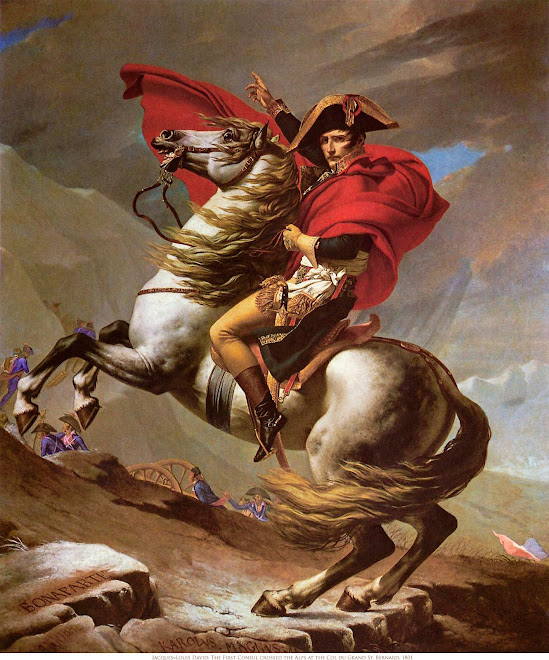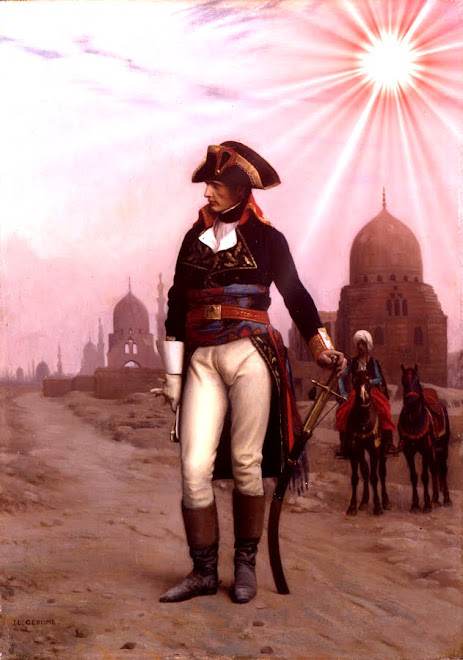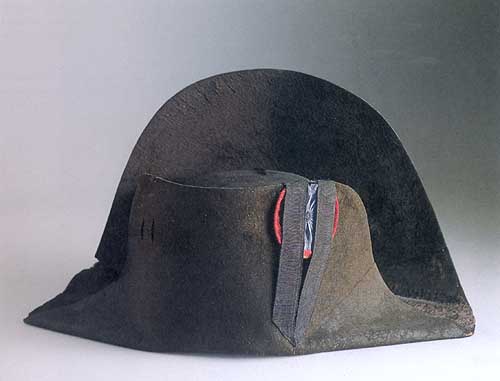Napoleon's Russian Campaign of 1812 was infamous for many reasons, not least for the enormous amount of casualties suffered by the French and their Allies. As well as the abnormally hot conditions that prevailed that summer two centuries ago, after an unseasonally mild autumn, the winter was the coldest in a 100 years. But what the retreating wraiths, shivering in their ragged uniforms worried most about was the sudden appearance of the Cossacks. Only a few dark figures on horseback brandishing their fearsome lances was enough to spook a whole brigade - not that the shabby caricatures of soldiers struggling to survive in temperatures of minus 20 were now travelling in organized bands. Very soon after the Grand Army left Moscow discipline dissolved and it was a question of every man for himself.
From the pictures above it can be seen just how long the Cossack lances were. As he left Vilna and neared Ponari Hill, where freezing French troops and their Russian antagonists momentarily suspended hostilities in order to grab gold napoleons from abandoned pay chests, Sergeant Bourgogne describes how he hid beneath an upturned cart in order to avoid the blade of a would-be assassin. Ravaged by illness, having been poisoned by heartless inhabitants of Vilna, Bourgogne was already half-dead with a frozen foot and frostbitten fingers, so avoiding his tormentor was far from easy.
The lance is a primitive weapon and harks back to the enormous spears carried by a phalanx of Macedonian hoplites. It was only when he saw how efficient his brave Polish warriors were with the weapon that Napoleon decided to add it to his armoury. In the circumstances in which the Grand Army found itself in November 1812, it was an ideal weapon. When firearms failed to fire because it was impossible to keep powder dry, and frozen fingers could no longer pull a trigger, a lance could be brandished under an arm and waved under the noses of any Cossack who got too close. So any soldier who came across one was very wise to pick it up and use it against the fleeting demons that surrounded his wounded and dying comrades.
Cossacks were basically an anachronism, their reputation had been made over the centuries fighting the Turks and but for the very unusual weather conditions in 1812 they would have been little more than an irritant to the practised arms of the Grand Army. Napoleon's forces made mincemeat of the Mamelukes in Egypt and then used their own spears to fish their bodies out of the Nile in order to rob them of their gold. But for a plethora of volcanic eruptions that dogged the last decade of the Little Ice Age (1810-1820) flinging countless tons of fiery dust up into the atmosphere and changing the weather for the worse, making it the coldest decade in the C19th and the Dalton sunspot minimum and a rapid El Nino - La Nina changeover event that both lowered global temperatures even further, the troops would probably have survived much better in a 'normal' Russian winter. It must be remembered that Kutuzov's Russians suffered almost as much from the cold as Napoleon's men. So if ever the Cossacks were going to get to grips with far superior forces, this was it.
The Cossacks had a well-earnt reputation for butchery. Their usual foes were the denizens of the south, the Turks and Tartars who chopped heads off their victims with casual abandon, so the warriors of the steppes adopted similar tactics themselves. There are many accounts of Russians stripping soldiers of the Grand Army naked and then marching them off in temperatures far below zero until they succumbed to the perishing cold. Or else they sold their prisoners to vindictive peasants who bashed their brains out with staves or whatever else was close at hand. Bourgogne and his best friend Picart witnessed such events when they were lost in the Lithuanian forest and desperately trying to find the Emperor and the remnants of the Guard. Picart was an excellent marksman and when Cossacks attacked him and Bourgogne they got the worst of it. The two Guardsmen then continued their journey on a captured cossack nag, Picart sat in front and Bourgogne sat at the back, facing the wrong way so he could be rearguard!
Cossack mounts were small and scruffy but they were incredibly tough and could survive on very poor fodder. The Grand Army lost thousands of its horses which were unused to the cold and simply could not exist without regular supplies of oats - especially the horses that pulled the cannons. So in the dying days of the Retreat, the last horses pulling the last cannons were sent ahead of the starving troops so when the animals inevitably collapsed, the troopers could rush upon them and cut off chunks of horseflesh before the carcasses set rock solid in the ice. And even when the horses still walked, men could slit their veins and drain off life-saving blood to sup themselves - the horses plodding on regardless, unable to feel a thing.
The Cossacks were often romanticized. Tolstoy wrote some great stories about them - The Cossacks and The Raid are two examples. He obviously admired their free-living and free-loving nature.
Soldiers in the Grand Army were amazed by the appearance of some of the 'Russian' forces as amongst them were orientals with bows and arrows as well as spears.
The Cossacks certainly caused a stir when they got to Paris in 1814 along with the other soldiers in Tsar Alexander's Army but their effect then was as nothing compared to the terror they instilled in the soldiers of the retreating Grand Army.
C. John Tarttelin 2011
A SOULADREAM PRODUCTION











No comments:
Post a Comment